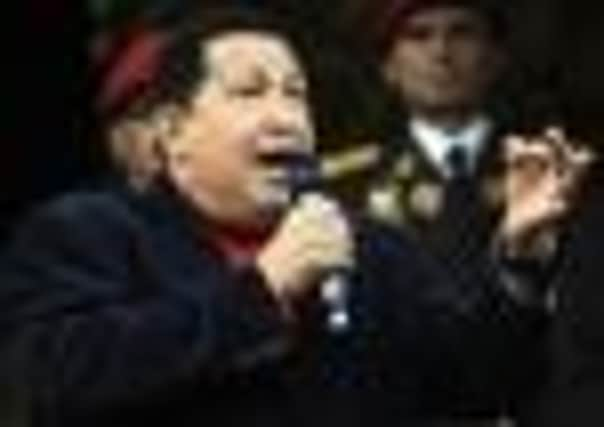Hugo Chavez death leaves Venezuela on riot alert


Speaking from Miraflores Palace, vice-president Nicholas Maduro, who was anointed as his successor, spoke of the “national tragedy” that had befallen his nation.
“It’s a moment of deep pain, but we must try to move forwards rather than backwards,” he said in an announcement on state television network VTV. “We must try to forget the past and move onward to a greater future for the whole country.”
Advertisement
Hide AdAdvertisement
Hide AdGunshots have been heard in districts of Caracas which have historically been strongholds of support for Lieutenant-Colonel Chavez.
“My mother told me not to come home tonight, to stay in the east where people are with the opposition,” said Oriana Gonzalez, who lives in western Caracas, but travels to her office job in Altamira in the east.
“It’s expected, everyone expected this sooner or later,” said Bruno Cruicchi, a businessman in the Candelaria district of Caracas. “Our emotions here are varying between sadness and acceptance. We have had a long time to consider this”.
“People around me are shutting up their shops and leaving early, because they fear there are going to be riots tonight.”
During more than 14 years in office, Mr Chavez routinely challenged the status quo at home and internationally.
He polarised Venezuelans with his confrontational and domineering style, yet was also a masterful communicator and strategist who tapped into nationalism to win broad support, particularly among the poor.
Mr Chávez repeatedly proved himself a political survivor. As an army paratroop commander, he led a failed coup in 1992, then was pardoned and elected president in 1998. He survived a coup against his own presidency in 2002 and won re-election two more times.
Military generals appeared on VTV last night to guarantee the “peace and security of the country”.
Advertisement
Hide AdAdvertisement
Hide Ad“We stand behind the president of the National Congress, Diosdado Cabello,” they said. This statement means more than a simple guarantee of safety, given that Mr Maduro was anointed Mr Chavez’s successor in the event of his death.
Under the Venezuelan constitution, it is Mr Cabello, as president of the National Congress who should resume power in the event of the leader’s death. He is known to have the support of the military.
Henrique Capriles, who lost to Mr Chavez in last year’s October election, is expected to stand again for the presidency.
Presidential elections will be called within 30 days.
A defeat for the socialist party would have large international implications, particularly for other socialist nations in the region, such as Cuba, which receives two-thirds of its petrol consumption (100,000 barrels a day) from Venezuela at vastly reduced rates.
Rogelio Enfrador, speaking with tears in his eyes from the Plaza Bolívar in central Caracas, said: “I feel awful. We’re were all waiting for this, but I can’t believe it’s happened”.
“He’s all of our father,” he continued, “he’s the father of this country. None of us expected to have to go through all of this”.
Some Venezuelans, remembering the president’s total three-month absence, refused to trust the government’s statements.
“Everything is spinning in uncertainty at the moment”, said Felix Ramón Piñero. “We’re in for a very difficult period.”